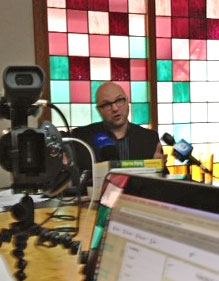
The Arms Procurement Commission is not a farce and should be supported – even though the first cabinet minister to appear before it was not subjected to a grilling about his knowledge of the suspect arms deal, and critics were not receiving access to documents they requested.
Addressing the media at a press conference on Thursday, former ANC MP Andrew Feinstein – who resigned after his attempts to investigate the R70-billion deal (in today’s terms) were stymied by the ruling party – insisted that the commission not be cancelled despite growing public scepticism.
The credibility of the commission, which has been holding public hearings since last August, was called into question last week when former trade and industry minister Alec Erwin – who was on the inter-ministerial committee which approved the deal – was not subjected to cross-examination and spent less than a day on the witness stand.
NGO Lawyers for Human Rights, representing Feinstein and fellow arms deal authors and critics Hennie van Heerden and Paul Holden at the commission, was not able to cross-examine Erwin after it was denied access to documents he had referred to in his testimony.
The commission, also known as the Seriti Commission after presiding judge Willie Seriti, was instituted in 2011 to probe allegations of corruption and irregularities around the purchase of fighter jets, submarines, corvettes, helicopters and tanks in 1999, intended to modernise SA’s national defences.
Despite admitting that things were “bleak” and that he was frustrated by the workings of the commission, Feinstein insisted he had not given up on it. “It is not a farce – if I thought it was a farce, I would say so. We’ve not yet got to that. There have been problems, we all know.”
Despite this, Feinstein said emphatically that the point had not yet been reached when he could say there is no future for this commission.
South Africans should care about the commission, he said, because if it was found that corruption took place, the government could cancel the contracts and recoup some of the money. “R70-billion is a lot of money. If the commission is going to contribute anything towards revealing the truth, then it is worth the while of people like ourselves,” he said.
Feinstein and Van Heerden also pointed out that the arms deal had had a huge impact on the lives of ordinary South Africans through the jobs that had been lost as well as the “children who didn’t get schooling or the houses that weren’t built”.
Worldwide interest
And the commission was not “just a small local issue”, they pointed out. The proceedings were being followed closely around the world, and especially by the international arms deal companies whose reputations would be damaged if they were found to have resorted to bribery and corruption to land contracts.
“The significance of this deal both locally and in its global context remains profound,” said Feinstein.
Meanwhile, Van Vuuren revealed that they had written to the commission this week requesting access to the nearly 4.7-million pages in a container at the offices of the National Prosecuting Authority. The pages were collected first by the Scorpions, then the Hawks during their investigation into the deal. City Press reported last year that the commission had not looked at the documents despite having possessed them for over two years.
Van Heerden said the documents were among scores of other documents they had requested but had not yet been allowed to view.
He also revealed that Armscor had admitted that a lot of documents, some of which might be important, had been “shredded”, never been seen or filed elsewhere because of the length of time that had elapsed.
“The mass shredding of documents is incredible given the history of this country when that took place under apartheid. Now more recently, a similar practice is applying,” he said.

